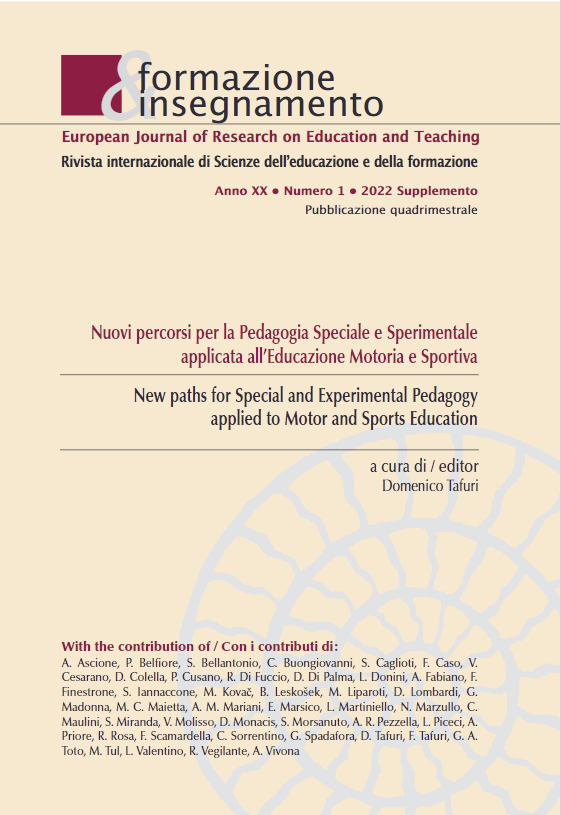New paths for Special and Experimental Pedagogy applied to Motor and Sports Education
Abstract
The growing awareness of the importance of motor and sports activities has made it assume great relevance in different everyday life contexts, and as a result, the educational nature that sport has taken on over time has been acknowledged, thus becoming a crucial component in all the main social interaction contexts. Among the areas of pedagogical reflection that have gained considerable space in the contemporary debate in recent decades, those relating to the body, movement and sport represent a very important cross-section as specific training tools, which should be highlighted the conditions of educability necessary for sport to represent a life context oriented towards emancipation for all subjects. Through this pedagogical dimension, in fact, young people can be offered a balanced growth from a socialization point of view and aimed at healthy lifestyles, thus highlighting the positive repercussions that it generates throughout one’s life. This is why, in Italy, sports practice in the educational context, among which the university one stands out, is assuming such an importance as to be considered one of the fundamental elements to take care of both psycho-physical and educational well-being. What emerges, therefore, is the need to provide children, families and universities with clarity regarding the promotion of sports education and didacts, with particular attention to its importance in the primary, secondary and aca-demic education system, and with the arduous task of enhancing its educational, sports, preventive, cultural and social purposes. The school and university system is certainly one of the places where people meet and relate, where the person’s growth does not depend only on didactic contents, but it needs an educational offer that is varied and considers the main protagonists of social interest, and a privileged environment for the development of a social culture that starts from childhood, offering a preventive intervention capable of intervening on the whole society. For this reason, it is worth highlighting the elements and modalities that characterize the educational value of motor sciences at school and of sport in leisure time, emphasizing that education to sport must be a path that covers several dimensions. In this regard, it is essential to start from the motor activity practiced at school, up to the introduction to sport and finally to its professional practice, in order to allow everyone to find his/her place and to work according to the maturity of his/her motor function and learning levels. Motor practice must be regarded as a tool for manifesting and training one’s potentials. Therefore, in the formal training dimension, it is fundamental precisely because the contents are subject to an active type of learning and to an effective participation, significantly incorporated through association mechanisms between the students’ cognitive dimension and motor potentials. The integration of motor and sports activity carried out in the educational context with the one that is practiced every day at an extracurricular level, has led to clear successes: students appear to be more focused in the classroom and more able to learn, demonstrating that the school/university-sport synergy is a valuable support for the teaching-learning pair, participating in major social challenges such as health and well-being improvement, management of conflict situations and inclusion of people with dis-abilities and from different cultural backgrounds. This issue plays a central role for the whole school and university education system, which increasingly deals with a heterogeneous environment with many social, psycho-physical and cultural differences; this system is called upon to equally guarantee the pursuit of both the “learning” and the “inclusion” objectives. In order to include students with disabilities, it is essential to remember that the fundamental objective of Italian Law n. 104/92, art. 12, par. 3, is the development of learning through communication, socialization and interpersonal relationships. Therefore, the educational project for students with disabilities, which can be extended to all those who are marked by diversity with respect to the peer group, must be developed with this priority in mind. An educational project based on the principle of the individual’s right to study and formation, also according to the logic of building a life project that allows the student to “have a future”, can only be defined within inclusive work groups. The Disabled person is included in a context in which he/she experiences and learns with others, when he/she shares objectives and work strategies and not when he/she lives, works and sits only next to others without playing an active role. In this regard, all approaches to educational work defined as innovative are of considerable interest, which, by adopting techniques and technologies, guarantee the centrality of the student, whether disabled or non-disabled, stimulating his/her active participation and improving his/her learning and training levels. The educational and training aspects concerning students, special pedagogical approaches, the main innovative teaching techniques and methodologies, and the motor and sports education fields, are deepened with clarity and effectiveness within this Special Issue, which stands as a valuable contribution to research in the field of didactic, pedagogical, motor and sports sciences.
Downloads
Published
How to Cite
Issue
Section
License
Copyright (c) 2022 Pensa MultiMedia

This work is licensed under a Creative Commons Attribution 4.0 International License.
Formazione & insegnamento is distributed under Attribution 4.0 International (CC BY 4.0).
For further details, please refer to our Repository & Archiving Policy, as well as our Copyright & Licensing Terms.





